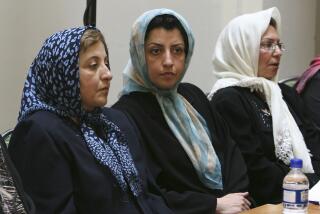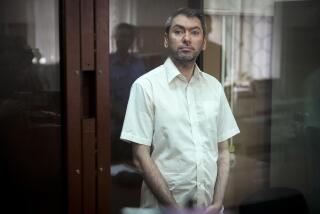The Games are over
- Share via
China threw the world a spectacular party in August, and yet, to the apparent surprise and dismay of Chinese officials, the guests still don’t seem all that grateful to their host.
On Thursday, the European Parliament awarded its top human-rights prize to an ailing Chinese activist who was jailed shortly before the Summer Olympic Games in Beijing. His crime: embarrassing his country’s leaders by pointing out their routine torture, imprisonment and harassment of political dissidents. That’s dangerous in China at any time, but especially so when the nation is on the verge of making a giant international splash (except in the diving events).
The European Union’s decision to award its Sakharov Prize to activist Hu Jia, despite an intense pressure campaign from Beijing, “violates universally recognized rules in the world, which is countries should treat each other as equals and respect each other,” complained Chinese Foreign Ministry spokesman Liu Jianchao.
Apparently we missed that page of the international rule book. We do recall Article 19 of the Universal Declaration of Human Rights, though. That’s the portion of the United Nations’ seminal 1948 document that states: “Everyone has the right to freedom of opinion and expression; this right includes freedom to hold opinions without interference and to seek, receive and impart information and ideas through any media and regardless of frontiers.”
Hu, 35, may be China’s highest-profile dissident since Wei Jingsheng, who was deported to the United States a decade ago (and who also won the Sakharov Prize, in 1996). After founding an organization that cares for AIDS orphans, Hu began chronicling government abuses on the Internet and contacting foreign journalists; the result was an escalating campaign of harassment by the police. The last straw may have come when, in September 2007, he coauthored “The Real China and the Olympics,” an open letter that described mass evictions to make way for stadium construction, imprisonment of journalists, Internet censorship, religious repression and other human rights violations, and showed China to be deeply unsuitable as an Olympic host. He was arrested in December and sentenced to 3 1/2 years in prison in April after a one-day trial. He is in poor health, and unless he’s granted medical parole, he may not survive his detention.
If Chinese leaders are tired of all the international attention being given to Hu, there’s a better solution than high dudgeon from the Foreign Ministry: They could set him free.
More to Read
Go beyond the scoreboard
Get the latest on L.A.'s teams in the daily Sports Report newsletter.
You may occasionally receive promotional content from the Los Angeles Times.






